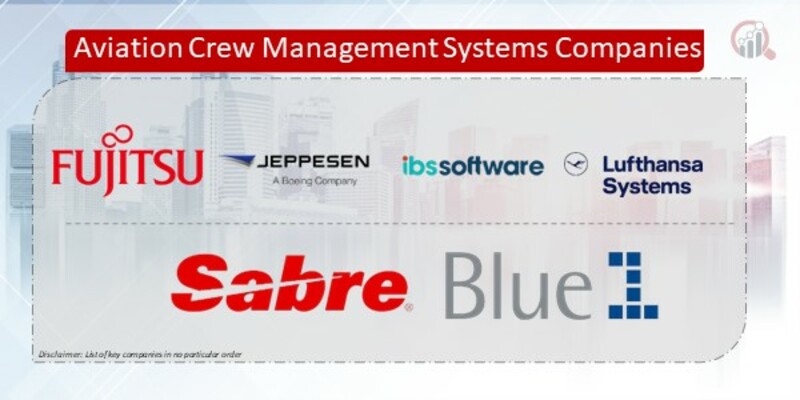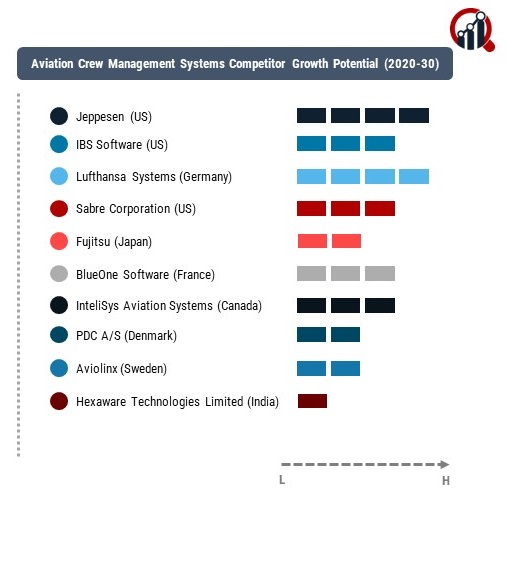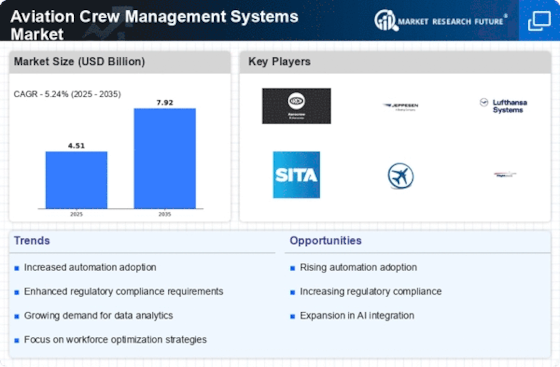Top Industry Leaders in the Aviation Crew Management Systems Market

Strategies Adopted:
Data Integration and Analysis: Key players focus on integrating data from various sources, including aircraft systems, sensors, operational databases, and external sources, to provide comprehensive analytics insights for aviation stakeholders.
Predictive Maintenance: Companies develop predictive maintenance solutions that use advanced analytics algorithms to forecast equipment failures, optimize maintenance schedules, and minimize downtime for aircraft and components.
Operational Efficiency Optimization: Strategies are adopted to optimize airline operations, airport management, and air traffic control through analytics-driven insights on fleet management, route optimization, crew scheduling, and passenger flow management.
Customer Experience Enhancement: Airlines and airports utilize analytics to personalize customer experiences, improve service quality, and enhance passenger satisfaction through targeted marketing, pricing optimization, and tailored service offerings.
Key Companies in the Aviation Analytics market include
Honeywell International Inc. (US)
Aviation Analytics (UK)
Airbus SAS (Netherlands)
Ramco Systems (India)
General Electric (US)
IBM Corporation (US)
Oracle (US)
Boeing (US)
SAS Institute Inc. (US)
SAP (Germany)
Booz Allen Hamilton Inc. (US)
Gray Matter Software Services Inc. (US)
Mercator Group (Chile)
Mercator Group (Chile)
Mu Sigma (India)
Embraer (Brazil)
IFS AB (Sweden)
Microsoft (US)
Rolls-Royce PLC (UK)
Factors for Market Share Analysis:
Analytical Capabilities: Market share analysis considers the breadth and depth of companies' analytical capabilities, including data integration, machine learning, predictive modeling, and visualization tools, as well as their ability to address specific aviation use cases and challenges.
Industry Expertise and Reputation: The depth of industry expertise, domain knowledge, and reputation for reliability, accuracy, and innovation influence market share by driving customer trust, loyalty, and preference for analytics solutions.
Customer Base and Relationships: The size, diversity, and loyalty of customer bases, as well as the strength of relationships with airlines, airports, OEMs, MROs, and other aviation stakeholders, play a crucial role in gaining market share and expanding market reach.
New and Emerging Companies:
FLYR Labs: FLYR Labs offers predictive analytics solutions for airline revenue management, pricing optimization, and demand forecasting, using machine learning algorithms to analyze market trends and customer behavior.
Presenso: Presenso provides predictive maintenance analytics solutions for aviation equipment and systems, leveraging AI-driven anomaly detection and predictive modeling to optimize maintenance operations and reduce costs.
Lumo: Lumo offers flight delay prediction and optimization solutions for airlines, using real-time data analytics and machine learning algorithms to forecast flight disruptions, minimize delays, and improve on-time performance.
Industry News and Current Trends:
Adoption of AI and Machine Learning: The aviation analytics market is witnessing increased adoption of AI and machine learning technologies to analyze large volumes of data, detect patterns, and generate actionable insights for aviation stakeholders.
Focus on Sustainability: Sustainability is emerging as a key trend in aviation analytics, with companies developing analytics solutions to optimize fuel consumption, reduce emissions, and minimize environmental impact throughout the aviation value chain.
Growth of Predictive Analytics: Predictive analytics is becoming increasingly prevalent in aviation for forecasting maintenance needs, predicting flight delays, optimizing crew scheduling, and improving operational efficiency and safety.
Overall Competitive Scenario:
The aviation analytics market is highly competitive, with key players competing for market share through innovation, industry expertise, and customer relationships. New entrants and emerging companies disrupt the market with specialized analytics solutions tailored to specific aviation use cases and challenges. Collaboration, innovation, and customer-centricity are essential for companies to maintain competitiveness and drive growth in this dynamic and rapidly evolving market.
Aviation Analytics Industry Developments
For Instance, July 2022
Teradata, Microsoft, and General Electric reached an agreement to work together on a customized solution to reduce carbon emissions. The companies are working on a system that will equip pilots with the resources they need to monitor emissions, report them, and act quickly to minimize them.
For Instance, July 2022
SAP SE purchased Askdata, a new company with an eye on search-driven analytics, to increase its ability to assist businesses in making better decisions. Real-time data may be searched, interacted with, and worked on collaboratively by users to maximize business insights.












